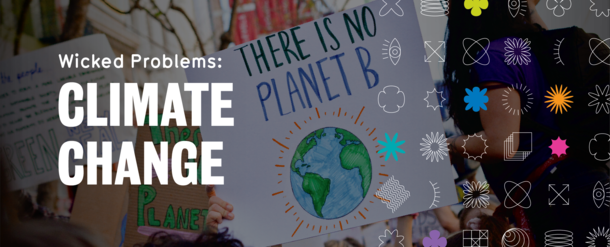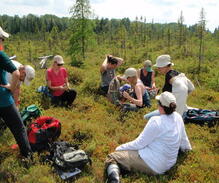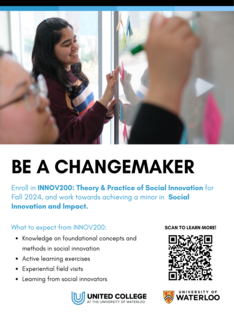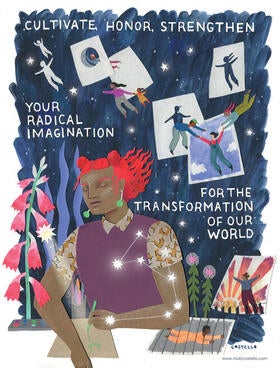Students should check in with The Centre on the first floor.
Each term, a variety of new courses are offered for the first time. Below is a centrally-maintained list of such courses, submitted by various academic units on campus. Click the course link to see the full course description in the Undergraduate Studies Academic Calendar. Browse through the list for course details and check back often for updates.
Fall 2024
Last updated: June 3, 2024
ARTS 390: Third-Year Topics in Arts Disciplines
Topic title: The Wicked Problem of Climate Change
Topic details: The Wicked Problem of Climate Change is available for upper-year undergraduate students (3A and higher) in Fall 2024 and will introduce students to innovative ways of learning – primarily through the integration of a flipped-classroom approach and cross-disciplinary perspectives on the topic of climate change. This course approaches the wicked problem of climate change from diverse disciplinary perspectives (i.e., applied sciences, health sciences, engineering) to investigate the various dimensions of this global challenge. Topics addressed may include the history of climate change and its scientific underpinnings, approaches to governance, climate change communication, and impacts on the natural environment, human health, society, culture, technology, and ecosystems. The course prepares students to analyze the wicked problem of climate change from an interdisciplinary perspective, to evaluate and critique diverse perspectives on the issue, and to devise potential solutions for mitigating and adapting to climate change.
Additional information:
- Learn more about the course and its team of instructors by visiting The Wicked Problem of Climate Change website.

BIOL 251: Fundamentals of Ecology
Course details: Explore the living world surrounding you in the latest Biology course that will introduce you to the field of Ecology. Learn how living things interact with members of their species, with other species, and with our changing world. Labs will include a field experience observing bird behaviour and growing your own microcosm to experiment with the consequences of nutrient pollution.
INNOV 200: Theory and Practice of Social Innovation and Impact
Course details: This course will introduce students to foundational concepts and methods in social innovation and impact. Students will engage in a series of classroom-based lectures, active learning exercises, and occasional experiential field visits to develop an understanding of how problems are identified and the unique response to such problems provided by the social innovation approach. INNOV 200 is taught by Tania Del Matto, an experienced entrepreneur and mentor to hundreds of students who have launched their social impact projects. Enroll in INNOV 200 for your chance to develop your identity as a changemaker in your community.
PACS 301 (Special Topics in Peace and Conflict Studies I)
Topic title: Prison and Police Abolition as Moral Imagination
Topic details: Ideas about what's right and wrong, good and bad, what's true, and what's beautiful often come from religious sources. How have moral perspectives and values from religion contributed to policing and incarceration in Canada and the U.S., and their especially deadly impacts on Black and Indigenous lives? How can anti-racist, decolonial and feminist approaches to moral imagination enable the potential abolition of policing and prisons, and the creation of a new society in which safety is not premised on violence? Examining these questions, this interdisciplinary peace and conflict studies course integrates insights from Black studies, liberation theologies, gender studies, contemporary anti-violence movements, and other sites of emancipatory knowledge production.
Additional information:
- Watch the course YouTube Video featuring course instructor, Dr. McCants-Turner.
- Please contact johonna.mccants-turner@uwaterloo.ca for further information.




